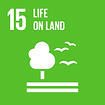
Sustainability
We want to be a part of a sustainable, regenerative, and inclusive agricultural ecosystem that harmonizes with nature, supports equitable societies, and nourishes the health of our customers. It is not a mere theoretical subject, but a practical way we design, build and operate our farms, starting from a multi-food and circular aquaponics farming
Sustainability
Development Goals
ESG is a journey that we have only just begun. Together with our stakeholders, we are pursuing activities and priorities relating to ecological harmony, resource efficiency, community engagements, governance, transparency and traceability, economic viability and also in the areas of innovation and collaborations.














Support Autism
Autism or Autism Spectrum Disorder (ASD) is a lifelong neuro-developmental condition. It is estimated that 1 in 150 people has various degrees of such condition. Early intervention can make a big difference to many children with ASD by improving their skills and quality of life and helping them to become more independent.
One of BlueAcres' farms is situated on the rooftop of an Autism school. The students work alongside our mature farmers to learn about farming. Through the partnership with the school, the farm serves as the vocational training farm for the students to learn farming skills.
Circular By Design
Sustainability is essential for protecting the environment. Sustainable practices such as recycling and reusing materials, contribute to reducing the environmental impact of human activities. These practices which are also a subset of the circular principles, when integrated into broader sustainability frameworks can help BlueAcres address environmental, social, and economic challenges for a more balanced and harmonious relationship with the planet.
We believe in a ground-up approach where possible hence circular principles are integrated early into the construction of our farms.
Our Environmental Targets
Carbon Neutrality

We have defined the approach to achieve our Scope 1, 2, and 3 GHG emissions targets and will continue to review and reduce our carbon footprint towards carbon neutrality.
Zero Waste

We have initiated a wide range of activities and protocols such as composting, plastic reduction and recycling to work towards the zero-waste target across all our farms.
Energy Efficiency

We intend to become more energy efficient by deploying more energy saving equipment, reduce electricity use through staff education and use of more renewable source such as solar energy.
Insects and Insect Proteins
We have started to research and use insect proteins to substitute the use of unsustainable fish meals in the feed of our aquaponics farm.
We are also working on integrating stingless bees into the farms to improve pollination of fruiting crops.
Biodiversity
We believe that biodiversity in urban farming is important because it contributes to the ecological, social, and economic sustainability of urban agriculture.
We have planned and implemented a variety of projects at our farm to reinvigorate the biodiversity of these farms.

Multi-food / Multi-Species Farming
We have adopted a multi-food, multi-species farming approach to create a vibrant ecosystem for improved biodiversity.
This has allowed us to manage crop rotations, fight pests, and also increase our sales per trip to customer.

Companion Plants
As a pesticide-fee farm, we are constantly researching for a more natural and effective way to manage pests and improve food diversity and nutrition.
We are currently studying and testing the effectiveness of companion plants for urban farms.



